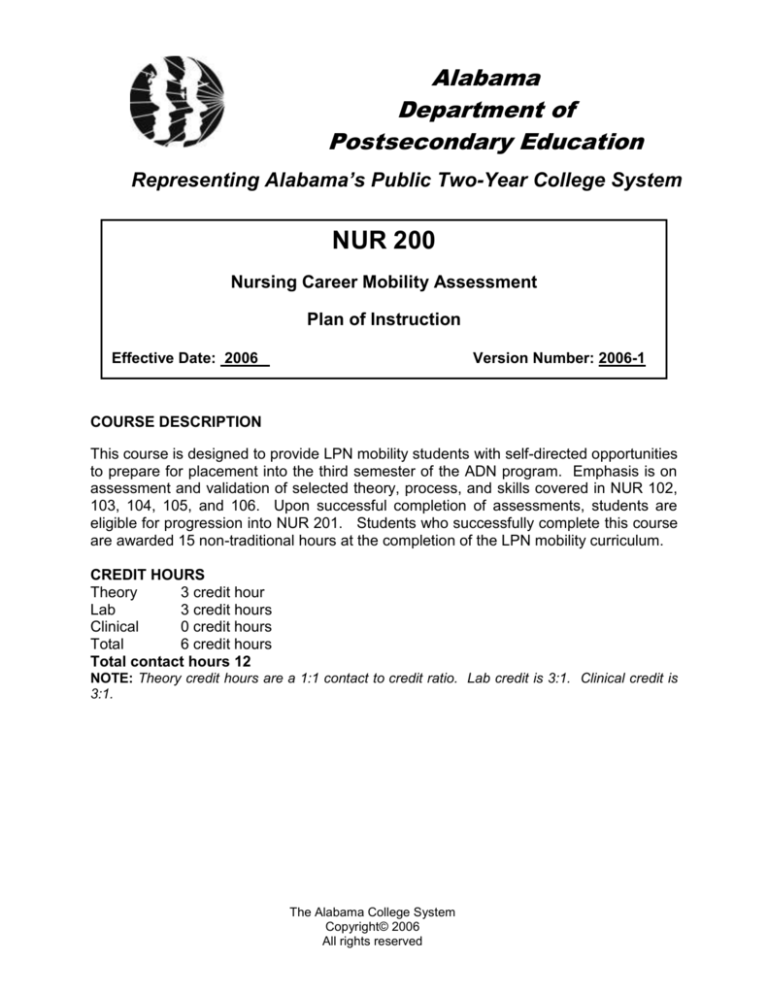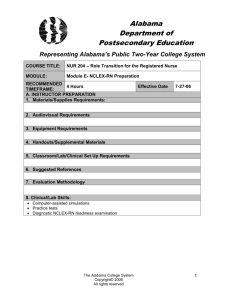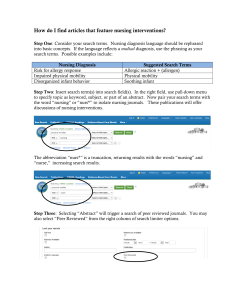
Alabama
Department of
Postsecondary Education
Representing Alabama’s Public Two-Year College System
NUR 200
Nursing Career Mobility Assessment
Plan of Instruction
Effective Date: 2006
Version Number: 2006-1
COURSE DESCRIPTION
This course is designed to provide LPN mobility students with self-directed opportunities
to prepare for placement into the third semester of the ADN program. Emphasis is on
assessment and validation of selected theory, process, and skills covered in NUR 102,
103, 104, 105, and 106. Upon successful completion of assessments, students are
eligible for progression into NUR 201. Students who successfully complete this course
are awarded 15 non-traditional hours at the completion of the LPN mobility curriculum.
CREDIT HOURS
Theory
3 credit hour
Lab
3 credit hours
Clinical
0 credit hours
Total
6 credit hours
Total contact hours 12
NOTE: Theory credit hours are a 1:1 contact to credit ratio. Lab credit is 3:1. Clinical credit is
3:1.
The Alabama College System
Copyright© 2006
All rights reserved
Nursing Career Mobility Assessment
NUR 200
INSTRUCTOR NOTES:
Graduates of the approved Alabama College System Practical Nursing
standardized curriculum may be eligible to enter the ADN program during the
third semester without taking these assessments if graduation occurred within
the previous two years. All other Licensed Practical Nurses must successfully
complete this course.
For progression into NUR 201, students must have documentation of
employment as an LPN for a minimum of 500-clock hours within the 12 months
prior to admission.
All students must have a valid unencumbered Alabama practical nurse license.
Students must satisfactorily pass knowledge assessments within two attempts
before attempting skill validations. Students are given two attempts for all
assessments. Students must pass both knowledge assessments and all skill
validations to be considered for eligibility into the ADN program. Satisfactory
completion of knowledge and skill validations is on a pass/fail standard set by the
Alabama College System.
Retests must be completed prior to the end of the semester. The college will
determine scheduling for retests.
Students are expected to utilize relevant technology in preparing for
assessments.
Students applying for admission to career mobility tracks will be assessed and
placed in rank order prior to admission into NUR 200.
Track 1 - For students who completed the Standardized ACS Nursing
curriculum more than 2 years prior to application for admission to Career
Mobility or for students who have graduated from any other PN curriculum.
There will be a limited number of available slots. The number of slots
available in NUR 200 and NUR 201 will be at the discretion of each college.
Track 2 - For students completing the Standardized ACS Nursing curriculum
within the previous 2 years. Students must meet progression criteria for NUR
201. The number of slots available will be at the discretion of each college. If
you have completed LPN curriculum in the last two years NUR 200 will
not be required. Each student will still be required to meet the 500 work
hours.
ACS Copyright© 2006
All rights reserved
2
Nursing Career Mobility Assessment
NUR 200
COURSE CONTENT OUTLINE
MODULE A – ORIENTATION
Review of school of nursing policies
Minimum mobility admission requirements
License
CPR
Health forms
GPA
Alternative options
o Testing policies
o Course enrollment in generic programs
Self-assessment
Individual knowledge and skills inventory
Resources
Lab schedules
Testing dates
Testing requirements/procedures
Knowledge
o Successful cognitive assessment before skills validation
o Pass/fail standards
o Advisement and analysis
Skills validation
o Pass/fail standards
o Advisement and analysis
MODULE B – FUNDAMENTALS OF NURSING
Safety
Risk factors
Body mechanics
Mobility
Environmental hazards
Medical and surgical asepsis
Safety devices (restraints)
Disaster management
Risk management issues
Activities of daily living
Hygiene
Toileting
Mobility
Skin Integrity
Therapeutic environment
ACS Copyright© 2006
All rights reserved
3
Nursing Career Mobility Assessment
NUR 200
Vital signs
Temperature
Pulse (central and peripheral)
Respiration
Blood Pressure
Pain
Communication skills
Establishing therapeutic nurse-client/family relationship
Communication process
Therapeutic/Non-Therapeutic communication
Barriers to effective communication
Documentation/reporting
Communication among healthcare team members
Professional behaviors
History of nursing
Nursing educational career paths
Competencies of the nurse
Standards of nursing practice
Legal/Ethical
Providing needs-based care
Maslow’s Hierarchy of Needs
Client/family lifespan
Impact of culture, ethnicity, spirituality, and sexuality
Effects of anxiety, stress and adaptation on homeostasis
The impact of grief and loss
Recording client care
Nursing process and critical thinking
Nursing process
Critical thinking and decision making
Comfort, pain, sleep and rest
Comfort measures
Pain management
Sleep promotion
Rest promotion
Nutrition/fluid balance
Intake and output
Therapeutic diets
Enteral nutrition
Nutrients
Parenteral therapy
ACS Copyright© 2006
All rights reserved
4
Nursing Career Mobility Assessment
NUR 200
Maintaining oxygenation
Oxygen administration
Nasopharyngeal suctioning
Oxygen maintenance
Pulse oximetry
Emergency procedures
Maintain elimination
Bowel/bladder elimination procedures
Catheterization
Urinary diversions
Ostomy care
Enema
Specimen collection
MODULE C – HEALTH ASSESSMENT
Growth and development throughout the life span
Pediatric
Adult
Geriatric
Health history
Obtaining a health history
Normal and abnormal assessment findings
Documenting assessment
Conducting a general survey
Techniques
Physical assessment
HEENT
Integumentary System
Respiratory System
Circulatory/Lymphatic System
Breast and Axillae
Abdomen
Reproductive System
Musculoskeletal System
Neurological System
ACS Copyright© 2006
All rights reserved
5
Nursing Career Mobility Assessment
NUR 200
MODULE D – INTRODUCTION TO PHARMACOLOGY
Introduction to pharmacology
Sources of drugs and drug information
Legal and ethical issues
Pharmacodynamics
Pharmacokinetics
Basic math for pharmacology
Calculation formulas
Systems of measurement
Administering medications
Safety Issues
Reading and interpreting medication orders
Reading and interpreting labels
Drug administration equipment/adaptive equipment
Reconstitution of medications
Calculating dosages
Preparing dosages for administration
Routes for administering medications
Insulin administration
Heparin administration
The six rights
Client/family teaching
Documenting medication administration
Calculating pediatric dosages
Milligrams/kilograms/body weight
Body surface area
Formulas for calculating pediatric dosages
Safe range
Intravenous calculations
Calculation of rates
Administering medications through tubes
Gastrointestinal tubes
Genitourinary tubes
Introduction to classification of drugs
Concept
Common drug classifications
ACS Copyright© 2006
All rights reserved
6
Nursing Career Mobility Assessment
NUR 200
MODULE E – ADULT NURSING
Fluid, electrolyte, and acid-base balance
Fluid and electrolyte homeostasis
Disturbances in fluid and electrolyte balance
Acid-base homeostasis
Acid-base alterations
IV therapy
Roles and responsibilities
Types and use of intravenous solutions
Equipment and supplies
Patient physical and psychological preparation for IV therapy
Venipuncture process
Flow rate problems
IV Complications and problems
Monitoring and maintenance of the IV
IV medications
Blood, blood products, and volume expanders
Perioperative care
Nurses role within perioperative settings
Informed consent
Pre-operative
Intraoperative
Post-operative
System alterations
General areas
o Diagnostic tests
o Alterations
o Nursing process
o Pharmacological agents
Integumentary system
o Pressure ulcers (Decubitus)
o Inflammatory
o Infections
o Skin Cancers
Respiratory system
o Acute Upper
o Chronic Upper
o Acute Lower
o Chronic Lower
o Occupational lung Diseases
ACS Copyright© 2006
All rights reserved
7
Nursing Career Mobility Assessment
NUR 200
Cardiovascular system alterations
o Hypertension
o Peripheral Vascular Alterations
o Hematological
o Congestive heart failure (left and right)
o Aneurysms
Endocrine system alterations
o Diabetes
o Acute and Chronic Complications
Upper gastrointestinal system alterations
o Infectious/Inflammatory
o Hiatal hernias
o Gastrostomy tube reinsertion and management
o Surgical procedures
o Cancers of upper GI
Musculo-skeletal system alterations
o Musculo-skeletal traumas
o Inflammatory alterations
o Degenerative alterations
o Gout
o Lyme disease
o Osteomylacia disease
o Surgical procedures
MODULE F – MATERNAL AND CHILD NURSING
Antepartum
Family dynamics
Preconception health promotional considerations
Fetal development
Signs of pregnancy
Physiological changes of pregnancy
Psychological adaptation to pregnancy
Prenatal education and care
Diagnostic tests
Pharmacological agents
Nutrition
Discomforts of pregnancy
Childbirth education
ACS Copyright© 2006
All rights reserved
8
Nursing Career Mobility Assessment
NUR 200
Complications of pregnancy
Nursing roles
Assessment of fetal well-being
Complications of pregnancy
Pathophysiology/Clinical manifestations
Diagnostic tests
Pharmacological agents/treatments
Nutritional considerations
Health promotion
Intrapartum
Onset of labor
Maternal responses to labor
Variables affecting labor
Stages of labor
Admissions of client in labor
Psychosocial care during intrapartum
Diagnostic tests
Nutritional considerations
Obstetric procedures
Induction/augmentation of labor
Pharmacology
Immediate newborn/mother care
Postpartum
Family adaptation
Physiologic changes
Psychosocial changes
Newborns’ and Mothers’ Health Protection Act of 1995
Health promotion
Vaginal/Cesarean birth
Diagnostic tests
Nutritional considerations
Pharmacological/treatments
Postpartal procedures
Complications
Teaching and learning for postpartal care and discharge
Newborn care
Care needs of the newborn
Physical characteristics of the newborn
Reflexes
Behavioral characteristics
Gestational age
Diagnostic tests
Nutritional considerations
Pharmacological agents/treatments for the newborn
ACS Copyright© 2006
All rights reserved
9
Nursing Career Mobility Assessment
NUR 200
Selected procedures
o Circumcision
o Hearing screens
o Heel sticks
o Serology screening
Complications
Cultural diversity
Teaching and learning
Pediatric care
Teaching and learning strategies
Preparing the pediatric client and family for hospitalization
Developmental assessments
Pediatric procedures
Scheduled immunizations
Nutritional considerations
Cultural diversity
Health promotion
End of life issues
MODULE G – SELECTED PEDIATRIC ALTERATIONS
Pathophysiology
Clinical manifestations
Diagnostic tests
Pharmacological agents/treatments
Nutritional considerations
Health promotion
Selected pediatric alterations
Respiratory system
Cardiovascular system and Blood Disorders
Infectious disorders, Lymphatic and Immune systems
Gastrointestinal system
Musculoskeletal system
Endocrine system
Integumentary system
Nervous system
Sensory system
Genitourinary system
Psychosocial disorders
ACS Copyright© 2006
All rights reserved
10
Nursing Career Mobility Assessment
NUR 200
MODULE H – SKILLS ASSESSMENT
Catheterization
Trach care
Starting and maintaining peripheral lines
Nasogastric tube insertion and maintenance
Suctioning
Oral
Nasopharyngeal
Tracheal
Medication administration and calculations
Oxygen administration
Ostomy care
Dressing change
Head-toe assessment
Vital signs
Enteral feeding
ACS Copyright© 2006
All rights reserved
11







